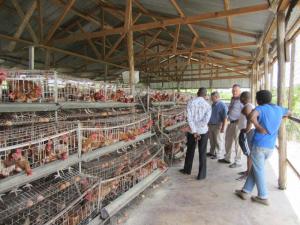This spring, the U.S. Grains Council launched the Tanzanian Food for Progress program, building on its success in other livestock and feed improvement programs throughout the world. The program has three goals:
• Promote quality feed formulations for poultry
• Develop self-sufficient industry associations for poultry producers and feed manufacturers
• Improve broiler (poultry raised for meat) and layer (poultry raised for eggs) production through training seminars
Investing in Feed Quality Testing
Efforts toward improving feed quality start with updating the government feed quality laboratory in the region. The lab will be outfitted with modern equipment to streamline the process of testing the quality of ingredients going into feed. Along with infrastructure, the Council will help train the staff running the lab on the new equipment and feed quality practices. Set to be fully operational in four years, the lab will allow poultry producers throughout the region to be confident in their feed quality.
To reach this goal, the Council has begun work with local and regional consultants to create an official plan to get the lab up and running in the four-year time frame. Once completed, the lab should be able to operate on its own with the ongoing support from the Tanzania Ministry of Livestock and Fisheries.
Expanding the Role of Industry Associations
Industry associations will also play a key role in growing the poultry and feed manufacturing industries in Tanzania. The Tanzania Poultry Breeders Association and Tanzania Feed Manufactures Association will serve their members by offering educational seminars and programs, and working with the local government to promote policies and regulations that benefit the poultry and feed industries.
In order to better serve both the poultry and feed manufacturing industries, the two respective associations will be further developed by USGC employees and their consultants in the region. They will model these associations after other successful programs in Africa, particularly in Morocco and South Africa.
“There are quite a few connections of some of our past projects in other African countries that we’ll be using as examples in our efforts in Tanzania,” said Cary Sifferath, USGC regional director for the Middle East and Africa.
Based on these examples, the Council will aid the associations at the Tanzania Poultry Expo in October by raising awareness of the advantages of membership. In the future, the Council will work to have the associations host the Expo so they can develop the funding necessary to continue their programs throughout the year.
“We’d like to have these associations be self-sustaining so they can always continue training, relationship building and pushing the industry to require quality, tested feed,” Sifferath stated.
Teaching Techniques for Better Poultry Production
Along with work on the feed laboratory and industry associations, the Council will conduct training seminars for poultry producers and feed manufacturers as part of the Tanzania Food for Progress program. The purpose of these programs, scheduled to start in the middle of June, is to educate local producers on the benefits of quality feed and introduce them to best practices for their industries. As part of the goal of self-sufficiency, the Council will host these seminars with the industry associations, so they can continue to offer training for their members in the future.
Through these seminars, poultry producers will learn feeding, housing and sanitation practices, among others, to help improve their production. In doing so, the Council aims to increase consumer confidence in the quality and safety of poultry, leading to more consumption.
Through the Food for Progress program in Tanzania, the Council hopes to develop a strong, self-sufficient poultry and feed manufacturing industry. By ensuring quality feed ingredients through the government feed quality laboratory and developing industry associations that help producers utilize quality feed to its fullest potential, the Council’s program will help poultry producers improve their operations and increase the confidence of consumers in the quality of poultry from Tanzania.


